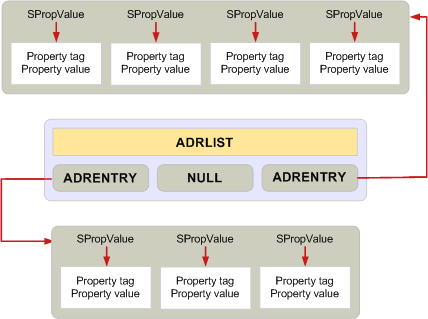Managing memory for ADRLIST and SRowSet structures"
Applies to: Outlook 2013 | Outlook 2016
The requirement to allocate all memory for a buffer whenever possible with a single MAPIAllocateBuffer call does not apply when using the address list, or ADRLIST, and row set, or SRowSet, structures.
These two structures are exceptions to the standard rules for allocating and releasing memory. They contain multiple levels of structures and are designed to enable individual members to be added or removed. Therefore, each property must be a separate allocation.
Where most structures are freed with one call to MAPIFreeBuffer, each individual entry in an ADRLIST or SRowSet structure must be freed with its own call to MAPIFreeBuffer or a single call to either FreeProws or FreePadrlist. For more information, see MAPIFreeBuffer, ADRLIST, and SRowSet.
FreeProws and FreePadrlist are functions provided by MAPI for simplifying the freeing of these data structures. For more information, see FreeProws and FreePadrlist. FreePadrlist frees the memory for the ADRLIST structure plus all associated memory for the structure members; FreeProws does the same for the SRowSet structure.
The following diagram shows the layout of an ADRLIST data structure, indicating the separate memory allocations required. The gray boxes show memory that can be allocated and released with one call.
ADRLIST memory allocation
